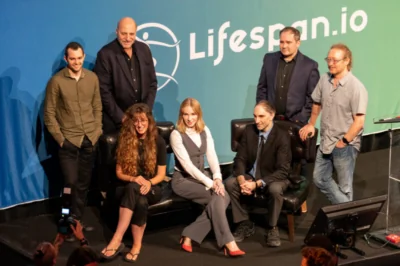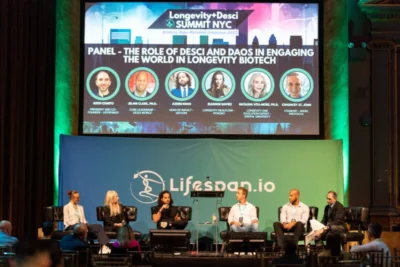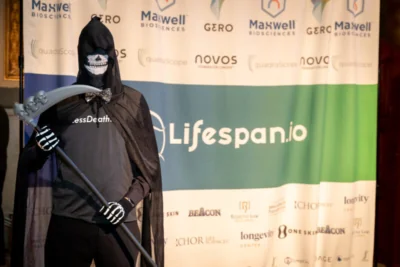Best Christmas Wishes from Lifespan.io
- We close out the year with projects and conference news.

The holidays are here, and it’s time for a well-earned rest and some festive fun with family and friends! We will take a look at what the Lifespan.io team has been up to recently, so sit back, relax, and enjoy a mince pie while you read the Christmas Editorial!
We have been working hard bringing you the latest rejuvenation research news, educational topics, and advocacy.
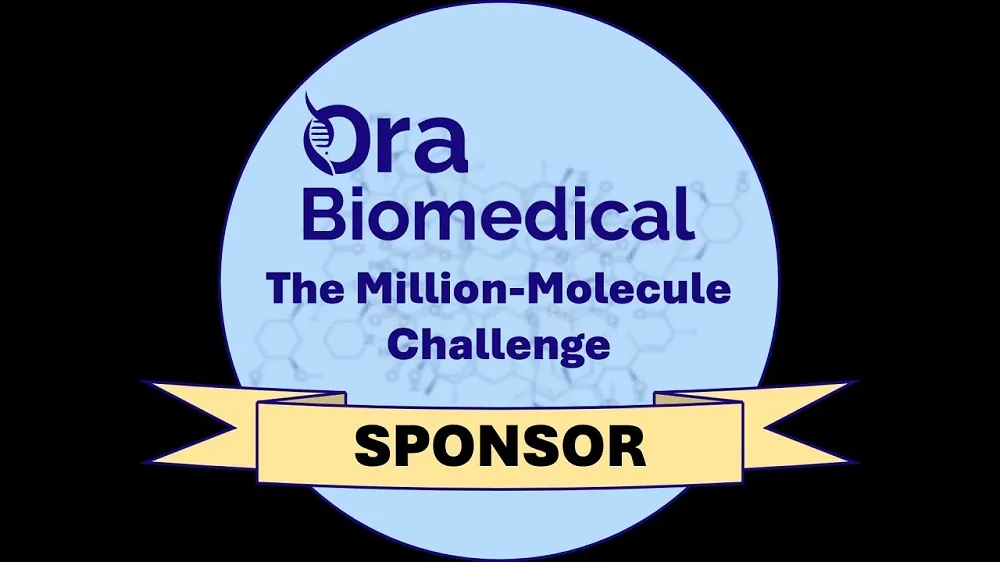
Ora Biomedical Million-Molecule Challenge
Researchers including Mitchell Lee and Matt Kaeberlein have launched The Million-Molecule Challenge with Ora Biomedical. This project will rapidly screen a vast number of compounds with the potential to increase healthy longevity.
Lifespan.io has teamed up with Ora Biomedical to provide fiscal sponsorship for this challenge. Fiscal sponsorship is when a nonprofit organization extends its tax-exempt status to specific groups and external projects aligned with the organization’s mission. In this case, Lifespan.io has chosen to support the Million-Molecule Challenge, as we believe that the project could lead to significant advances in our understanding of aging and potential interventions against it.
You can sponsor intervention(s) to be tested or even propose your own experiment as part of the project. Check out the Million-Molecule Challenge page to find out more.
EARD videos now available
Following the success of our Ending Age-Related Diseases 2023 conference in New York City, we are publishing the videos for you to enjoy. You can find a selection of talks, panels, and workshops in the playlist below, and more will be added in the coming months.


The conference showcased the fusion of research and decentralized science and how the two combined can speed up progress. We would like to thank our sponsors, speakers, media partners, and everyone who joined us for the conference and made it a huge success.
Mindset progress report
The goal of the Mindset project is to create a therapeutic device that utilizes light and sound to fight against Alzheimer’s disease. Leading this project is Dr. Oliver Medvedik, who is a researcher and the vice president of Lifespan.io.
This innovative intervention, which does not involve medication, seeks to address Alzheimer’s by using a headset that stimulates the brain through the use of light and sound in order to activate neural entrainment.
Neural entrainment refers to the observation that brainwaves naturally synchronize with external stimuli that have a rhythmic pattern, such as flickering lights and sounds. Evidence suggests that by triggering neural entrainment, it may be possible to reduce the decline in functional connectivity, counteract brain shrinkage, and enhance cognitive function.
The good news is that the Mindset project has been moving forward rapidly and with good initial results. Dr. Medvedik gave us an update on how things are going with Mindset.
The MindSet team has hit several important milestones on the way towards commercialization of their technology to enhance brain wave activity in the minds of people afflicted with Alzheimer’s Disease and related dementias. One such milestone the team reached earlier this year is being awarded a non-provisional patent for the technological platform they intend to use to deliver precise “doses” of electronic stimuli, such as sound and light, to participants. Prior research from several different laboratories has demonstrated the ability of such stimuli to help boost the cognitive abilities of participants. The research work the MindSet team is presently carrying out is to increase the capabilities of these promising protocols, including improving cognition in normal individuals and to greatly expand the participant pool using online tools.
The MindSet project, with the intent to spin out as a for-profit venture, was initiated by Lifespan.io cofounders Keith Comito and Oliver Medvedik and later joined by Ryan McGarry, formerly of SparkNeuro. Dr. McGarry brings expertise in EEG analysis to the project, as well as having successfully completed research for a previous $1 million direct to Phase 2 SBIR (Small Business Independent Research) grant for the US Air Force on which he was the Principal Investigator. For this work he led a series of studies with the goal of developing a system and machine learning classifier that automatically detects a subject’s familiarity with presented identities based on their brain’s response, using EEG data.
Frustrated with the lack of progress being made towards effective therapies targeting Alzheimer’s disease and related dementias, the team started to research approaches that were unconventional yet showed promising results in pre-clinical and small-scale clinical trials. The fact that they were also non-pharmacological in nature meant that they would also be challenging for typical pharma companies to test and market. This is where the MindSet project team decided to step in and push the boundaries on this novel approach.
To do so, a critical part of the project will be to set up a decentralized science platform where participants can upload protocols and results from at-home trials where the data can be openly analyzed to best determine the efficacy of a wide variety of protocols. This contrasts with traditional clinical trials where patients must stick to a rigid protocol and make frequent visits to either a research center or a clinic. The very nature of the approach that the team is using, being entirely electronic and software-based, means that data gathering can be greatly expedited using cloud-based technologies and enabled smart devices.
We will update you on the Mindset project in the new year once things develop further. Hopefully, this headset will ultimately help people suffering from Alzheimer’s and bring some relief to them and their loved ones.
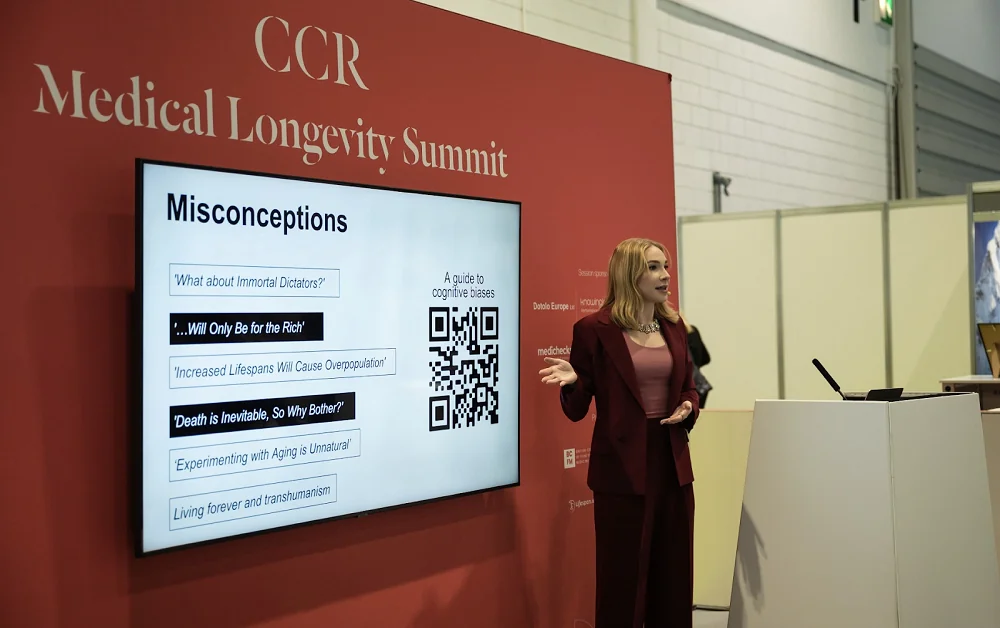
Lifespan.io at the Longevity Medical Summit
Executive Director Stephanie Dainow was a guest speaker at the CCR 2023 Longevity Medical Summit held in London.
Steph had this to say about the event:
I am pleased to report that “longevity” is increasingly a topic of conversation among medical practitioners and other healthcare professionals. This shift signifies both the field’s growth and a heightened engagement from patients concerning their long-term health.
It was great to see this particular audience recognize the risks associated with adding a #longevity hashtag to marketing and healthcare services being offered.
While hashtags can enhance visibility and engagement, they also pose certain risks in the context of biotech:
Misinformation and Oversimplification: Hashtags inherently simplify messages. In the complex realm of longevity biotech, this simplification has the propensity to result in the dissemination of misleading or incomplete information, inadvertently shaping public understanding based on snippets rather than the full spectrum of scientific research.
Balancing Public Perception and Expectations: The use of catchy hashtags can generate excitement but also unrealistic expectations. In biotechnology, particularly in longevity research, managing these expectations is crucial. Public disillusionment can arise when the outcomes do not align with the hyped promises, potentially impacting the developing field’s sustainable development.
Market Dynamics and Investment: Hashtags can significantly influence market dynamics and investment trends. In biotech, where investment decisions are crucial, a trending hashtag could lead to a surge in uninformed or speculative investments, potentially creating bubbles or diverting resources from other important areas.
Overall, the caution stems from the understanding that while adding the word “longevity” to your product or service can be a powerful tool for awareness and engagement, it also carries the risk of distorting complex scientific fields like longevity biotechnology, with far-reaching consequences. We advocate for its strategic use, ensuring that public engagement does not come at the cost of accuracy and informed understanding.
It was refreshing to see that the organizers of the Medical Longevity Summit understood these important components of driving better health effectively. I am looking forward to going to future events and being part of the continued conversation about longevity and the responsible marketing around it.

Our plans for 2024 are BIG, and we need your support
Finally, before we sign off and wish you a Merry Christmas and a Happy New Year we would like to ask you for a favor.
We are a nonprofit and rely on the support of our readers to keep offering the rich variety of longevity focused content we do. We have some ambitious plans for 2024, and here are just a few of them:
- Sponsorship of groundbreaking, underfunded research.
- Trustworthy longevity news and education, reaching as many as one million people per month.
- High-impact collaborations, such as our partnership with Chris Hemsworth’s Centr.
- Accelerating and funding numerous longevity biotech startups through our Longevity Investor Network.
- Dispelling misconceptions and changing the narrative around aging, rejuvenation, and longevity.
Your support matters, now more than ever. Join us in making a lasting impact by contributing to our year-end fundraiser. Together, we can create a healthier future for everyone!
That’s it from the Lifespan.io team for this year. Wishing a Happy Holiday and New Year to you all!


